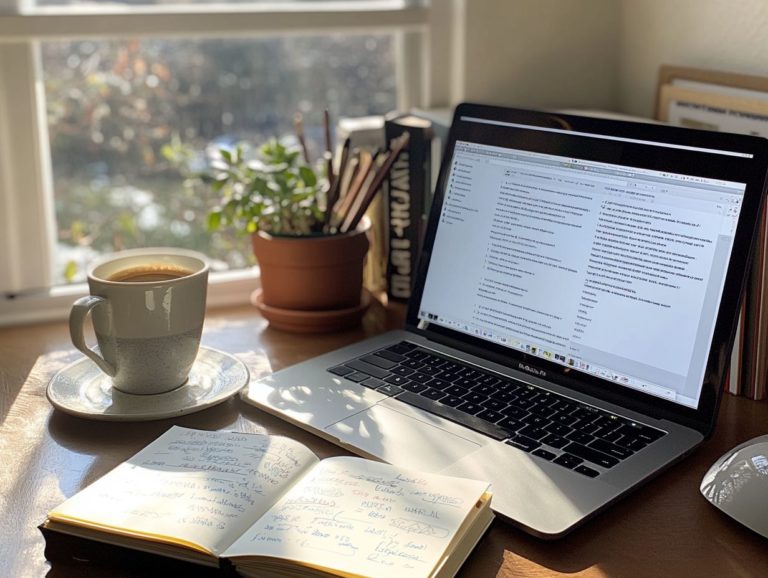7 Ways to Create a Productive Study Space
Creating an effective study space is crucial for enhancing your focus and productivity. The right environment can dramatically influence how you absorb information and tackle your tasks.
Get ready to discover seven powerful strategies that will transform your study space! This guide offers practical tips to help you establish a dedicated study area that reduces distractions and increases your potential. From selecting the ideal location to personalizing your space with inspiring decor, each tip is crafted to create a sanctuary for academic success.
Uncover how a thoughtfully designed study space can elevate your learning experience!
Contents
- Key Takeaways:
- 1. Choose a Quiet and Distraction-Free Area
- 2. Keep Your Study Space Clean and Organized
- 3. Make Sure You Have Proper Lighting
- 4. Invest in Comfortable and Ergonomic Furniture
- 5. Personaliza tu espacio de estudio con decoraci n motivacional
- 6. Keep Your Study Supplies Close and Handy
- 7. Utilize Technology for Better Organization and Productivity
- What Are the Benefits of Having a Dedicated Study Space?
- How Can a Study Space Affect Your Focus and Concentration?
- What Are Some Common Mistakes to Avoid When Creating a Study Space?
- How Can One Create a Study Space in a Small Living Space?
- What Are Some Creative Ways to Personalize Your Study Space?
- How Can a Study Space Help with Time Management and Productivity?
- What Are Some Tips for Maintaining a Productive Study Space?
- Frequently Asked Questions
- What are some ways to create a productive study space?
- How can I eliminate distractions in my study space?
- Why is lighting important in a study space?
- How can I make my study space more comfortable?
- Why is it important to have a dedicated study space?
- Can I study effectively without a designated study space?
Key Takeaways:
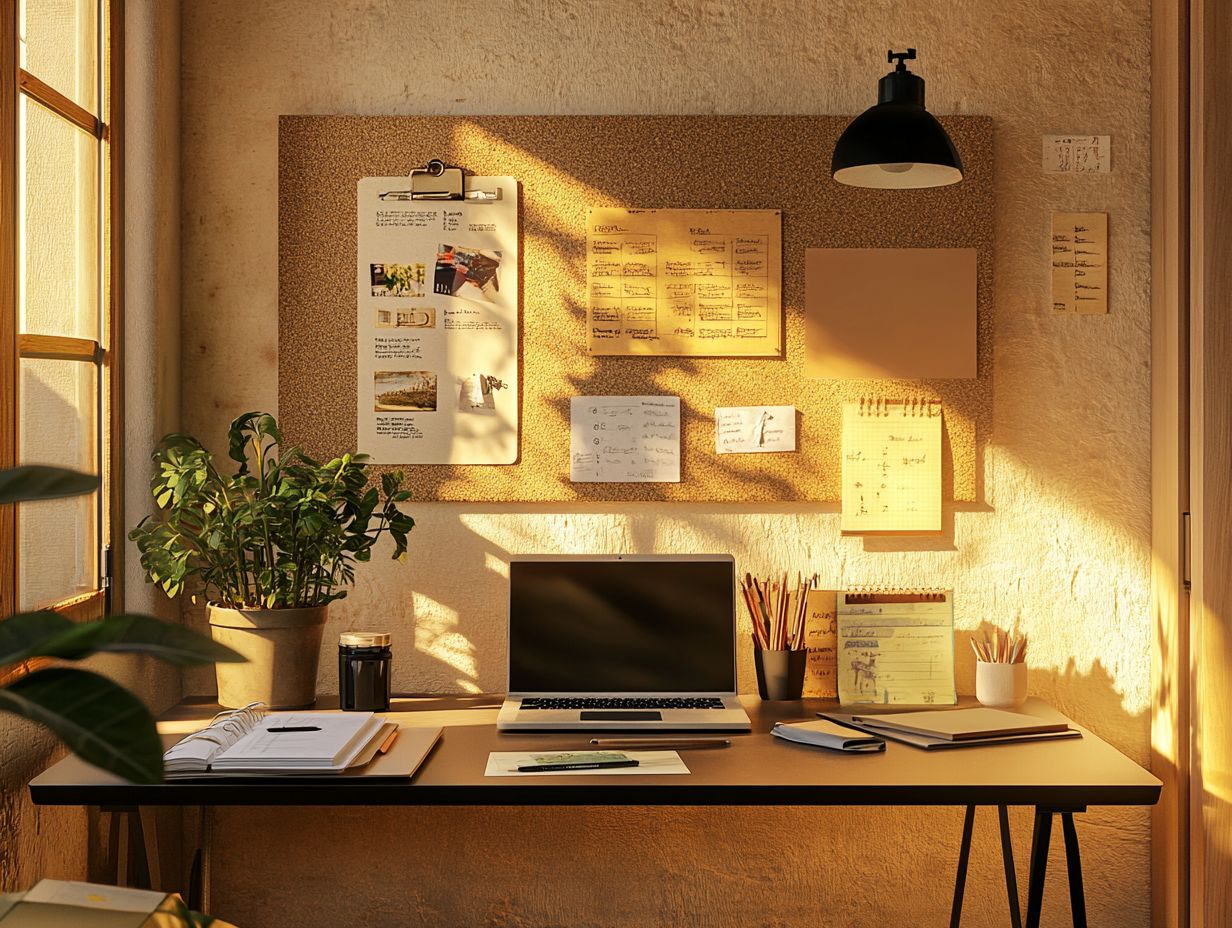
Choose a quiet area to reduce interruptions and increase focus while studying. Keep your study space clean and organized to create a more conducive learning environment. Proper lighting is essential for a comfortable study space.
1. Choose a Quiet and Distraction-Free Area
Selecting a quiet, distraction-free area is essential for you, a college student striving to boost your productivity during study sessions. This minimizes interruptions and allows you to dive deep into your academic materials.
Dedicated study spaces help you absorb information better. Academic buildings often feature specialized study rooms tailored for this purpose. Public libraries serve as timeless sanctuaries where the low noise level creates an ideal environment for learning. Study lounges can balance comfort and tranquility, making them perfect for both collaborative projects and individual work.
To truly create a distraction-free environment, consider:
- Investing in noise-canceling headphones.
- Establishing clear boundaries regarding study times with roommates and peers.
These steps can further elevate your focus and productivity, setting you up for academic success.
2. Keep Your Study Space Clean and Organized
A clean and organized study space is crucial for maximizing your focus. Clutter can lead to stress and make it difficult for you to concentrate effectively.
By creating a comfortable and inviting environment, you can approach your studies with clarity and purpose. Establish designated spots for essential items like textbooks, writing utensils, and calendars to boost your efficiency.
For example, keeping your textbooks neatly stacked and within reach saves time and cultivates a sense of readiness. Organizing your writing utensils in a dedicated container eliminates unnecessary searching, allowing you to effortlessly transform your thoughts into written form.
Incorporating a calendar or planner on your desk ensures that important deadlines are always visible. This simple step helps you manage your time effectively and reduces last-minute stress.
3. Make Sure You Have Proper Lighting
Proper lighting conditions are essential in your study space. Good lighting can enhance your concentration and reduce eye strain, making study sessions more enjoyable.
Utilizing natural light is often the best option. It helps regulate your body’s natural sleep-wake cycle and creates a vibrant atmosphere. Positioning your study desk near a window maximizes these benefits, allowing soft daylight to interact beautifully with your study materials.
Investing in desk lamps with adjustable brightness is invaluable for longer study hours, ensuring the light remains gentle yet adequate. It s crucial to avoid harsh overhead lighting, which can create an uncomfortable glare.
By blending various lighting sources, you can create a cozy and inviting study area that truly fosters productivity.
Transform your study space now and watch your productivity soar!
4. Invest in Comfortable and Ergonomic Furniture
Investing wisely keeps you energized and ready to tackle any study challenge! Comfortable and ergonomic furniture is crucial for crafting an effective study space. It helps prevent fatigue and discomfort, allowing you to focus more deeply during your study sessions.
Imagine a well-designed workspace featuring supportive chairs and adjustable standing desks. This setup can significantly enhance your concentration and overall productivity. Ergonomic arrangements aren t merely a luxury; they re essential for anyone facing long hours of study. They promote proper posture and help reduce the risk of musculoskeletal issues.
The right furniture cultivates a healthier working environment and elevates your motivation and creativity. By prioritizing comfort and functionality, you ll be ready to tackle challenging subjects and manage assignments with ease, making your educational journey more enjoyable and effective.
5. Personaliza tu espacio de estudio con decoraci n motivacional
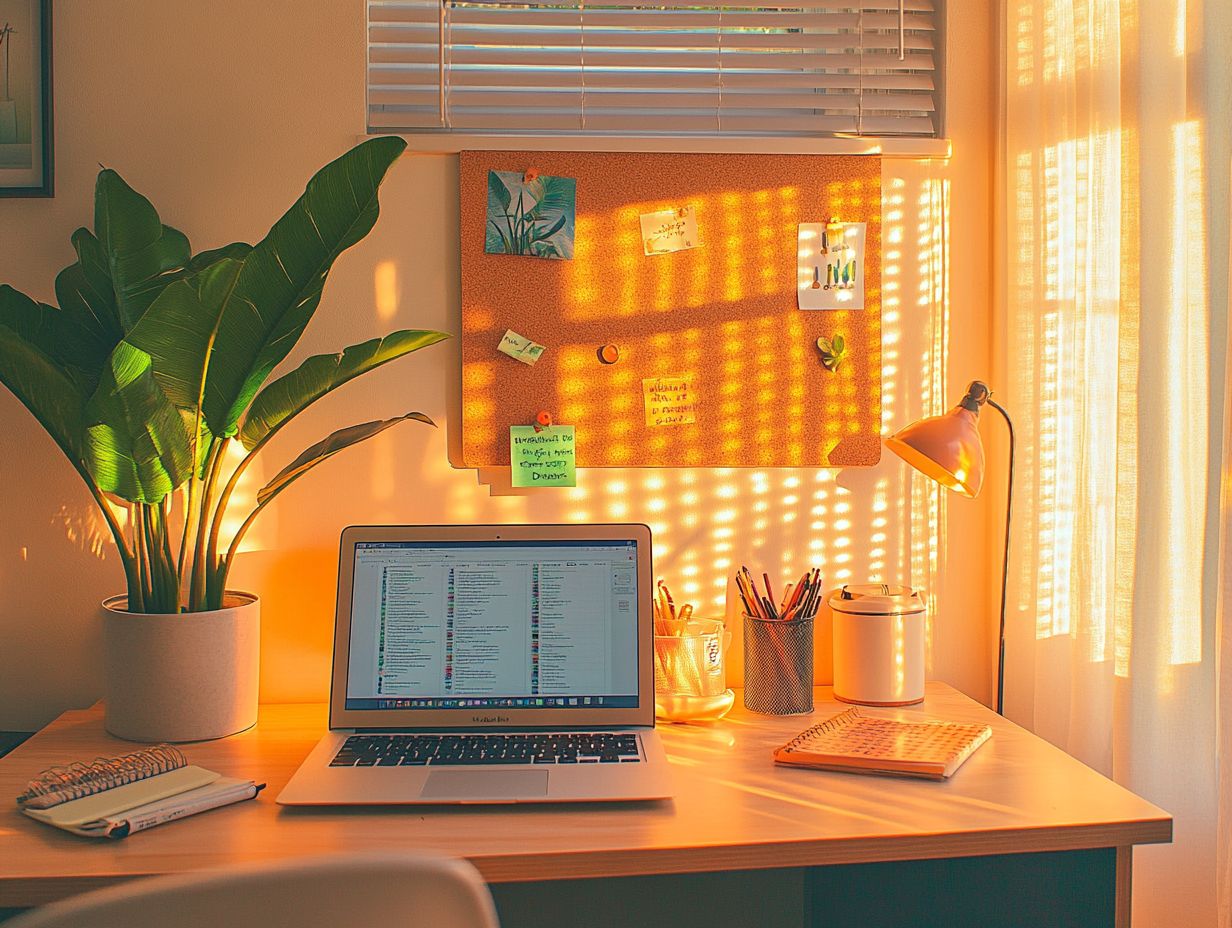
Personalizing your study space with motivational decor can significantly enhance your focus and motivation. Transform your study sessions into productive endeavors with thoughtful elements.
Consider incorporating:
- Inspiring quotes displayed on vibrant posters
- Artwork that ignites your creativity
- Cherished personal items such as photos and mementos that evoke uplifting memories
Your personalized space shows what you care about. This creativity infuses your space with energy and serves as a constant reminder of your goals, nurturing a mindset that fosters effective studying.
Each carefully selected piece acts as a visual cue, reinforcing your determination. It helps maintain a sense of purpose, even during those challenging study marathons.
6. Keep Your Study Supplies Close and Handy
Having all the necessary supplies within reach in your study space is essential for maintaining focus and preventing distractions. It cuts down on the time you spend searching for materials, allowing you to keep your concentration intact.
When you ensure that items like textbooks, writing utensils, and calendars are readily available, you create an environment that promotes uninterrupted learning. This setup boosts your productivity.
With everything in its designated spot, you can quickly jot down notes or reference crucial information. This makes your study time much more efficient. The ease of accessing these tools gives you the power to delve deeper into your studies, reinforcing knowledge retention while minimizing the temptation to wander off task.
7. Utilize Technology for Better Organization and Productivity
Incorporating technology into your study space can significantly enhance your organization and productivity. This is especially helpful if you’re a college student navigating online classes and collaborating on group projects.
By using digital calendars and task management software, you can keep track of deadlines, appointments, and tasks effortlessly.
Apps like Trello or Todoist let you create to-do lists and prioritize assignments, ensuring that nothing slips through the cracks. Cloud-based platforms like Google Drive make file sharing and real-time collaboration seamless, transforming group projects into streamlined experiences.
With these resources at your fingertips, you can refine your study processes, alleviate stress, and boost your efficiency while juggling your academic responsibilities.
What Are the Benefits of Having a Dedicated Study Space?
Having a dedicated study space offers you a wealth of benefits, including enhanced focus and productivity. This is because it creates an environment specifically tailored for academic work free from the distractions that might pop up in a dorm room or a bustling coffee shop.
This customized setting can significantly improve your time management skills, ensuring that your study sessions are both efficient and purposeful. For instance, having a designated desk stocked with all the necessary supplies encourages a streamlined approach to tackling assignments.
Physically separating your study space from your leisure areas reinforces a positive mindset. You ll often find that you are more motivated to achieve your academic goals when you step into a space that visually signals work.
Such a strategic setup not only elevates your academic performance but also has the potential to lower stress levels, ultimately fostering a more balanced and rewarding college experience.
How Can a Study Space Affect Your Focus and Concentration?
A well-designed study space has a profound impact on your focus and concentration. Factors such as noise level, lighting conditions, and ergonomic setup are crucial in creating a good place to study.
Take noise levels, for example. A quiet atmosphere is vital; however, you might find that soft background music or white noise can help mask distracting sounds and enhance your focus. On the flip side, inadequate lighting can lead to eye strain and fatigue, making it increasingly difficult to maintain your attention.
By incorporating natural light and adjustable lamps, you can strike a balance that feels both comfortable and energizing. Don t underestimate the power of an ergonomic chair and desk, which means they are designed for comfort and efficiency. They not only improve your physical comfort but also promote longer study sessions by reducing distractions related to discomfort.
By implementing these strategies, you create a conducive atmosphere that ultimately boosts your academic performance.
What Are Some Common Mistakes to Avoid When Creating a Study Space?
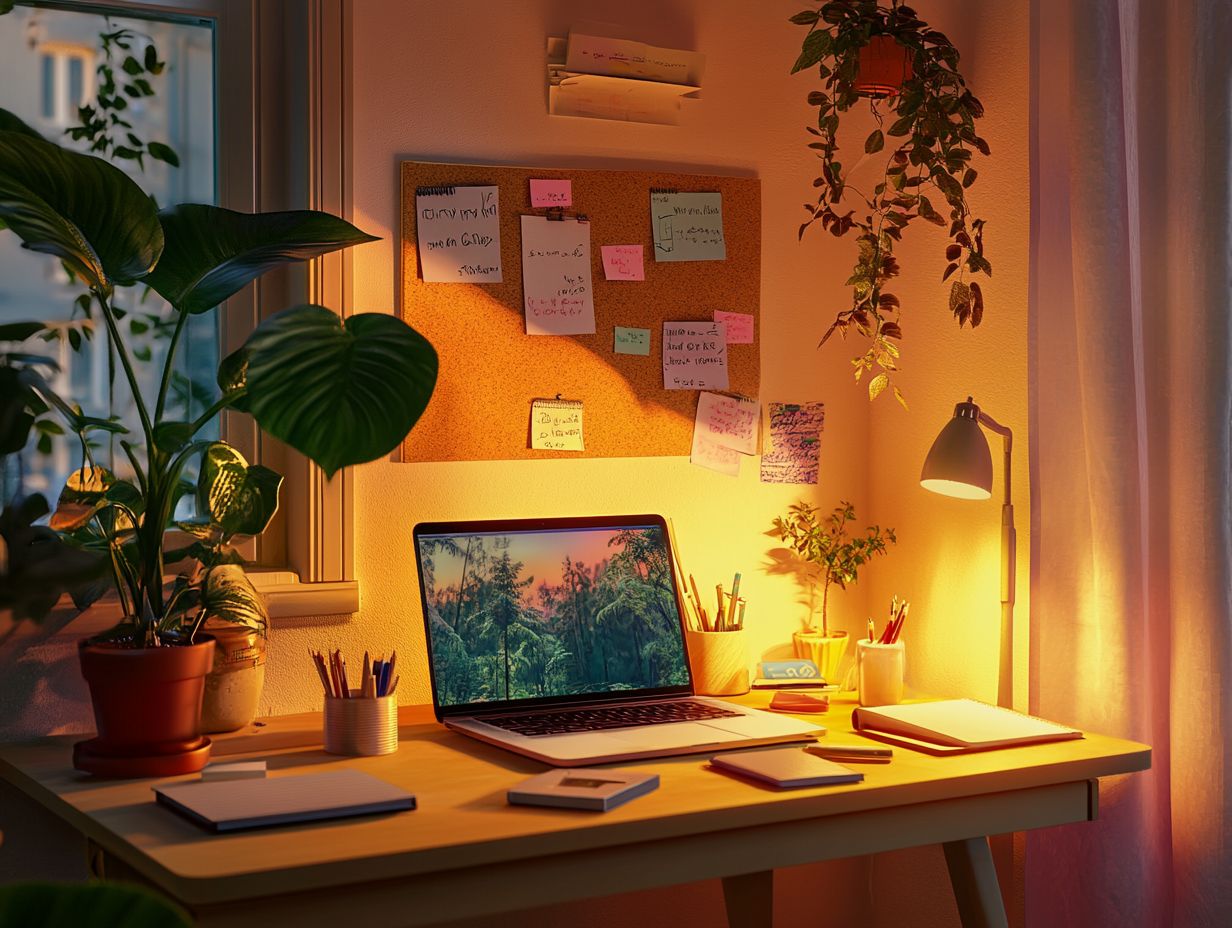
When you re setting up your study space, it s easy to fall into common traps that can sabotage your focus and productivity.
Allowing distractions to infiltrate your environment or neglecting to keep things clutter-free can really hinder your efforts. Poor organization often translates to wasted time spent searching for materials, while inadequate lighting can strain your eyes and detract from your concentration. Uncomfortable furniture invites distraction and discomfort during those long hours of studying.
To avoid these pitfalls, consider investing in sturdy, ergonomic chairs and desks designed for extended use. Proper lighting solutions, like adjustable desk lamps, can significantly enhance visibility and lessen eye fatigue. Keeping your study area tidy and well-organized with shelves and bins for storage helps you stay focused and creates a more productive atmosphere.
How Can One Create a Study Space in a Small Living Space?
Transforming your small space into a study haven is totally possible and can supercharge your learning! Creating a functional study space in a small living area can feel daunting, especially for college students. However, with some strategic planning and the right essentials, you can transform your space into an effective environment for focused study sessions.
Small adjustments can lead to impressive gains in productivity. To kick things off, consider investing in multifunctional furniture like a desk with built-in shelves or an ottoman that doubles as storage which can free up invaluable floor space.
Organizing your supplies using vertical storage solutions, such as wall-mounted shelves or pegboards, allows you to keep essential items within easy reach while minimizing clutter. Regularly decluttering your workspace is just as crucial. A clean and organized environment not only reduces distractions but also creates a sense of calm, setting the perfect stage for more productive study times.
Start redesigning your space today and watch your productivity soar!
What Are Some Creative Ways to Personalize Your Study Space?
Personalizing your study space can transform it into an inviting and inspiring haven. This allows you to express your individuality while boosting your motivation with creative decor and thoughtful touches.
By incorporating your favorite colors into wall art, desk accessories, and your seating area, you create a visually appealing environment that truly reflects your personal style.
Adding motivational quotes on sticky notes or custom prints serves as a daily reminder to stay focused and energized.
You can elevate the atmosphere by integrating DIY projects, like a handcrafted bulletin board or a personalized calendar, adding a unique flair.
These elements not only spark creativity but also create a space that gives you the power to dive into your studies with enthusiasm and a strong sense of ownership.
How Can a Study Space Help with Time Management and Productivity?
A well-structured study space significantly enhances your mastery of time management and elevates your productivity. It provides a dedicated environment to efficiently tackle academic tasks.
By creating a clutter-free zone, you minimize distractions, allowing yourself to focus better during study sessions. Implement a schedule with specific study blocks to encourage a consistent routine and foster productive habits.
You can enhance this environment by using tools like planners or digital apps for reminders. Break larger projects into smaller, manageable tasks and set clear goals for each session.
Incorporating short breaks between study periods refreshes your mind, making it easier to absorb and retain information.
What Are Some Tips for Maintaining a Productive Study Space?
Maintaining a productive study space requires consistent effort to keep the area clutter-free and organized. This ensures it remains conducive to focused study sessions.
Set aside time each week for regular decluttering. Assess which materials are essential and dispose of outdated notes or unnecessary items.
Evaluate the ergonomic setup of your desk and chair to prevent discomfort during long hours of study.
Adjusting your lighting conditions can make a significant difference. While natural light is the gold standard, using adjustable desk lamps greatly enhances visibility and reduces eye strain if natural light isn’t an option.
By incorporating these practical tips into your routine, you’ll find that your focus and productivity will notably improve over time.
Frequently Asked Questions
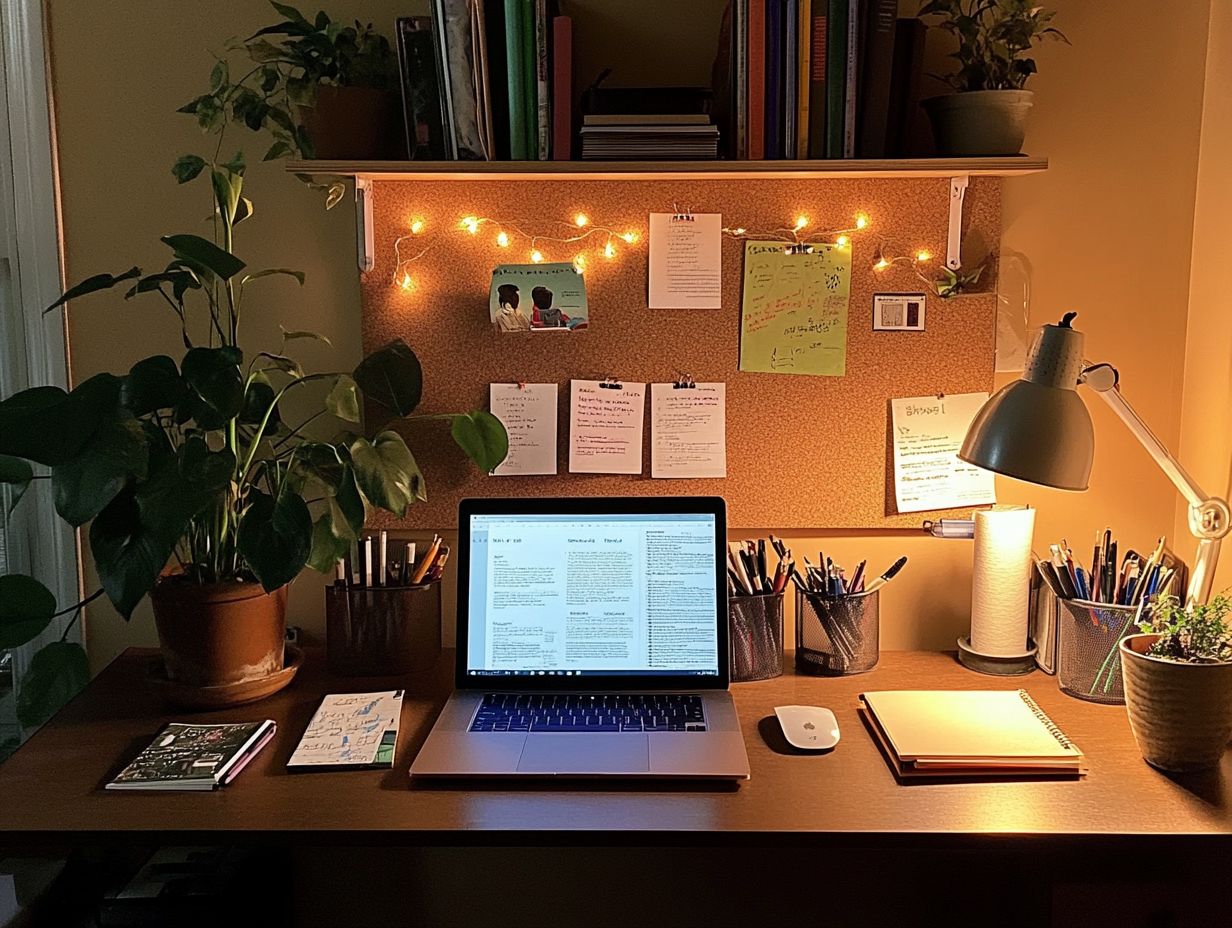
What are some ways to create a productive study space?
- Keep your study area tidy to stay focused.
- Use natural lighting or a good desk lamp to improve focus and reduce eye strain.
- Have all necessary study materials and supplies easily accessible to avoid wasting time looking for them.
- Include comfortable seating and proper ergonomics to promote comfort and prevent physical strain.
- Utilize noise-cancelling headphones or a white noise machine to block out external noises.
- Dedicate your study space solely to studying, avoiding activities that may reduce productivity.
- Establish a designated study schedule to maintain consistency.
How can I eliminate distractions in my study space?
One effective way to eliminate distractions is to remove anything not necessary for studying, such as your phone, TV, or gaming console. Using noise-cancelling headphones or a white noise machine can also help block out external noises. Keeping your study area organized and clutter-free is essential for minimizing distractions.
Why is lighting important in a study space?
Lighting significantly impacts your ability to focus and retain information. Natural lighting improves mood and productivity, while a well-lit study space reduces eye strain and headaches. Good lighting is essential for reading and writing comfortably.
How can I make my study space more comfortable?
To make your study space more comfortable, invest in a quality chair with proper back support. Adding cushions or a footrest can improve posture and reduce physical strain. It s also important to have a well-lit and well-ventilated space to avoid feeling cramped or uncomfortable.
Why is it important to have a dedicated study space?
Creating a study space can boost your learning! A dedicated study space helps link that area to studying.
This setup promotes focus and discipline. When you’re in that space, your brain knows it’s time to study.
It also helps separate your work from personal life. This balance is essential for your overall well-being.
Can I study effectively without a designated study space?
You don t need a specific study area to learn well! You can be productive anywhere if you have the right mindset.
Eliminating distractions is key. For instance, libraries and quiet coffee shops can be great alternatives if home isn t an option.






